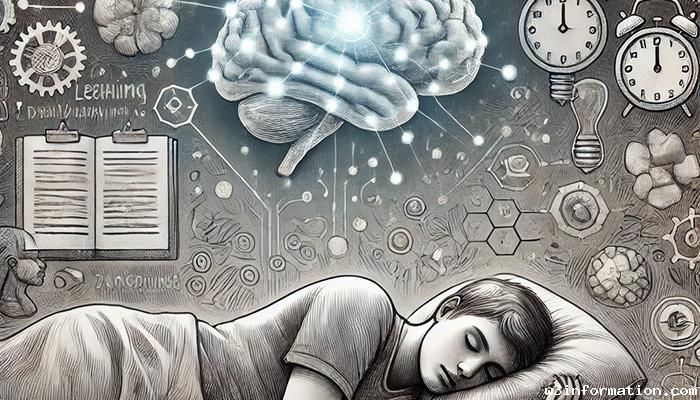The Role of Sleep in Cognitive Performance
The biological process of sleep holds essential importance for maintaining overall health and well-being. Sleep extends beyond physical rejuvenation because it serves as a critical factor for cognitive performance by impacting memory and learning as well as problem-solving and decision-making abilities. Lack of sufficient sleep causes mental performance problems and leads to decreased work output along with heightened mental exhaustion. Maintaining optimal cognitive abilities and mental sharpness requires understanding the impact of sleep on brain function.
The Science Behind Sleep and Brain Function
Multiple stages of sleep exist with each stage serving distinct functions for brain performance. Sleep is split into two fundamental types known as Non-Rapid Eye Movement (NREM) sleep and Rapid Eye Movement (REM) sleep.
NREM Sleep
The stage of sleep that includes light to deep sleep functions to restore physical health and consolidate memories.
REM Sleep: During this phase both dreaming and cognitive processing occur which supports problem-solving abilities as well as creativity and emotional control functions.
During sleep the brain performs vital processes such as synaptic pruning alongside toxin removal and neural connection strengthening. The processes lead to improved learning capabilities alongside stronger information retention and greater mental clarity.

Sleep and Memory Consolidation
Memory consolidation stands as a critical function through which sleep significantly improves cognitive performance. In deep sleep the brain performs the critical task of processing daily information while organizing it into long-term memory storage from short-term memory. Research indicates people who receive enough sleep excel at memory tasks compared to individuals who suffer from sleep deprivation.
During REM sleep the brain reinforces procedural memory which is vital for acquiring new abilities like learning to play an instrument or picking up a new language. Insufficient sleep undermines the brain's ability to preserve memories and retrieve information which results in forgetfulness and reduced learning capability.
Long-term sleep deprivation results in significant cognitive deficits that manifest as
Reduced creativity and problem-solving skills
Weakened ability to focus and process information
Increased susceptibility to stress and anxiety
Chronic sleep deprivation increases the likelihood of developing neurodegenerative diseases like Alzheimer's.
Poor sleep leads to mood disturbances which create emotional instability and increased irritability then further decrease cognitive abilities.
Sleep and Brain Detoxification
The brain performs essential detoxification during sleep by using the glymphatic system to eliminate waste including dangerous toxins and beta-amyloid proteins which are associated with Alzheimer's disease. The absence of adequate sleep interferes with brain detoxification systems and results in neurotoxic substance buildup that gradually hinders mental abilities.
When individuals focus on getting quality sleep their brain health benefits while their cognitive decline slows down and their mental performance gets better.
The Ideal Sleep Duration for Cognitive Performance
Optimal cognitive function requires different amounts of sleep which depend on age and personal needs. Most adults require between seven and nine hours of sleep each night to achieve optimal mental function according to scientific studies.
Not obtaining the advised amount of sleep on a regular basis produces accumulated cognitive impairments which resemble the consequences of alcohol intoxication. The deficit of proper sleep over time is impossible to make up for in one night which highlights the importance of sticking to a regular sleep routine.
Strategies to Improve Sleep Quality
Improving sleep quality leads to substantial enhancements in cognitive performance. Some effective sleep strategies include:
Maintaining a Consistent Sleep Schedule: Adhering to consistent sleep times helps stabilize the body's natural rhythms.
Creating a Relaxing Bedtime Routine: Participating in relaxing activities like reading and meditation creates conditions for better sleep quality by promoting tranquility.
Limiting Screen Time Before Bed: Melatonin production decreases under the influence of blue light from electronic devices which leads to disrupted sleep patterns.
Optimizing Sleep Environment: Sleep quality improves when a person rests on a comfortable mattress while maintaining a cool room temperature and keeping noise levels to a minimum.
Reducing Caffeine and Alcohol Intake: Caffeine acts as a stimulant that blocks sleep while alcohol disrupts normal sleep cycles.
Engaging in Regular Physical Activity: Physical activity enhances sleep patterns yet is not recommended before bedtime.
Conclusion
Sleep serves as a crucial foundation for cognitive functions that affect memory retention as well as focus and the ability to solve problems and make decisions. Long-lasting sleep deprivation damages brain function which results in cognitive deterioration as well as mood changes and ongoing health hazards. Prioritizing high-quality sleep and establishing healthy sleep routines enables individuals to strengthen cognitive functions while enhancing learning results and safeguarding mental health.
 Top 10 Comfort Foods to Try This Winter
Top 10 Comfort Foods to Try This Winter
 Top 10 Christmas Destinations Around the World
Top 10 Christmas Destinations Around the World
 Navigating Adolescence: Tips for Parents and Teens
Navigating Adolescence: Tips for Parents and Teens
 How to Start a DIY Craft Project on a Budget
How to Start a DIY Craft Project on a Budget
 How to Build Strong Family Bonds in the Digital Age
How to Build Strong Family Bonds in the Digital Age
 The Importance of Early Childhood Education
The Importance of Early Childhood Education